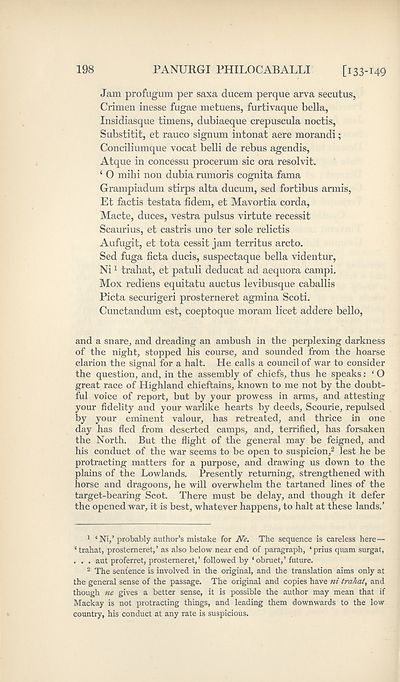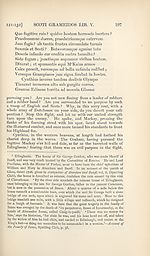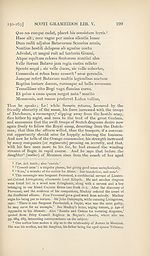Series 1 > Grameid: an heroic poem descriptive of the campaign of Viscount Dundee in 1689, and other pieces
(269) Page 198
Download files
Complete book:
Individual page:
Thumbnail gallery: Grid view | List view

198
PANURGI PHILOCABALLI [133-149
Jam profugum per saxa ducem perque arva secutus,
Crimen inesse fugae metuens, furtivaque bella,
Insidiasque timens, dubiaeque crepuscula noctis,
Substitit, et rauco signum intonat aere morandi;
Conciliumque vocat belli de rebus agendis,
Atque in concessu procerum sic ora resolvit.
‘ O mihi non dubia rumoris cognita fama
Grampiadum stirps alta ducum, sed fortibus armis,
Et factis testata fidem, et Mavortia corda,
Macte, duces, vestra pulsus virtute recessit
Scaurius, et castris uno ter sole relictis
Aufugit, et tota cessit jam territus arcto.
Sed fuga ficta ducis, suspectaque bella videntur,
Ni1 trahat, et patuli deducat ad aequora campi.
Mox rediens equitatu auctus levibusque caballis
Picta securigeri prosterneret agmina Scoti.
Cunctandum est, coeptoque moram licet addere bello,
and a snare, and dreading an ambush in the perplexing darkness
of the night, stopped his course, and sounded from the hoarse
clarion the signal for a halt. He calls a council of war to consider
the question, and, in the assembly of chiefs, thus he speaks: ‘ O
great race of Highland chieftains, known to me not by the doubt¬
ful voice of report, but by your prowess in arms, and attesting
your fidelity and your warlike hearts by deeds, Scourie, repulsed
by your eminent valour, has retreated, and thrice in one
day has fled from deserted camps, and, terrified, has forsaken
the North. But the flight of the general may be feigned, and
his conduct of the war seems to be open to suspicion,2 lest he be
protracting matters for a purpose, and drawing us down to the
plains of the Lowlands. Presently returning, strengthened with
horse and dragoons, he will overwhelm the tartaned lines of the
target-bearing Scot. There must be delay, and though it defer
the opened war, it is best, whatever happens, to halt at these lands.’
1 ‘ Ni,’ probably author’s mistake for Ne. The sequence is careless here—
‘ trahat, prosterneret,’ as also below near end of paragraph, ‘prius quam surgat,
. . . aut proferret, prosterneret,’ followed by ‘obruet,’ future.
2 The sentence is involved in the original, and the translation aims only at
the general sense of the passage. The original and copies have ni trahat, and
though ne gives a better sense, it is possible the author may mean that if
Mackay is not protracting things, and leading them downwards to the low
country, his conduct at any rate is suspicious.
PANURGI PHILOCABALLI [133-149
Jam profugum per saxa ducem perque arva secutus,
Crimen inesse fugae metuens, furtivaque bella,
Insidiasque timens, dubiaeque crepuscula noctis,
Substitit, et rauco signum intonat aere morandi;
Conciliumque vocat belli de rebus agendis,
Atque in concessu procerum sic ora resolvit.
‘ O mihi non dubia rumoris cognita fama
Grampiadum stirps alta ducum, sed fortibus armis,
Et factis testata fidem, et Mavortia corda,
Macte, duces, vestra pulsus virtute recessit
Scaurius, et castris uno ter sole relictis
Aufugit, et tota cessit jam territus arcto.
Sed fuga ficta ducis, suspectaque bella videntur,
Ni1 trahat, et patuli deducat ad aequora campi.
Mox rediens equitatu auctus levibusque caballis
Picta securigeri prosterneret agmina Scoti.
Cunctandum est, coeptoque moram licet addere bello,
and a snare, and dreading an ambush in the perplexing darkness
of the night, stopped his course, and sounded from the hoarse
clarion the signal for a halt. He calls a council of war to consider
the question, and, in the assembly of chiefs, thus he speaks: ‘ O
great race of Highland chieftains, known to me not by the doubt¬
ful voice of report, but by your prowess in arms, and attesting
your fidelity and your warlike hearts by deeds, Scourie, repulsed
by your eminent valour, has retreated, and thrice in one
day has fled from deserted camps, and, terrified, has forsaken
the North. But the flight of the general may be feigned, and
his conduct of the war seems to be open to suspicion,2 lest he be
protracting matters for a purpose, and drawing us down to the
plains of the Lowlands. Presently returning, strengthened with
horse and dragoons, he will overwhelm the tartaned lines of the
target-bearing Scot. There must be delay, and though it defer
the opened war, it is best, whatever happens, to halt at these lands.’
1 ‘ Ni,’ probably author’s mistake for Ne. The sequence is careless here—
‘ trahat, prosterneret,’ as also below near end of paragraph, ‘prius quam surgat,
. . . aut proferret, prosterneret,’ followed by ‘obruet,’ future.
2 The sentence is involved in the original, and the translation aims only at
the general sense of the passage. The original and copies have ni trahat, and
though ne gives a better sense, it is possible the author may mean that if
Mackay is not protracting things, and leading them downwards to the low
country, his conduct at any rate is suspicious.
Set display mode to:
![]() Universal Viewer |
Universal Viewer | ![]() Mirador |
Large image | Transcription
Mirador |
Large image | Transcription
Images and transcriptions on this page, including medium image downloads, may be used under the Creative Commons Attribution 4.0 International Licence unless otherwise stated. ![]()
| Scottish History Society volumes > Series 1 > Grameid: an heroic poem descriptive of the campaign of Viscount Dundee in 1689, and other pieces > (269) Page 198 |
|---|
| Permanent URL | https://digital.nls.uk/126598785 |
|---|
| Attribution and copyright: |
|
|---|
| Description | Over 180 volumes, published by the Scottish History Society, containing original sources on Scotland's history and people. With a wide range of subjects, the books collectively cover all periods from the 12th to 20th centuries, and reflect changing trends in Scottish history. Sources are accompanied by scholarly interpretation, references and bibliographies. Volumes are usually published annually, and more digitised volumes will be added as they become available. |
|---|


